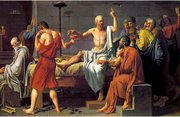Deduction is the process of figuring things out that are necessary true, provided that the assumption we start with, called the premises, are true. Geometry is based on deductive thinking. So are all those word problems you had to do in math class.
Aristotle provided a famous example of a kind of deduction that he called a syllogism. It consists of three statements: two premises and a conclusion.
Here is Aristotle’s syllogism about Socrates:
All men are mortal
Socrates is a man
Socrates is mortal
From the two premises, we can deduce the conclusion for certain.
As Aristotle himself noticed, the conclusion is only certain if the premises in fact true. If all men aren’t mortal, or if Socrates is not a man, then the conclusion that Socrates is mortal may be false.
As you’ll see later in chapter 7, Aristotle developed a whole philosophical system –including epistemology, metaphysics, and ethics- largely with the help of syllogism that assured him that his ideas were logically consistent. And, for the most part, his ideas are logically consistent. Unfortunately, this doesn’t make them all true. Many of Aristotle’s premises can be shown to be false.
Even so, Aristotle’s thinking has been extremely influential; partly because he has helped other philosophers focus on the logical consistency of their ideas. Deduction is the best way to expand what we already know. If we can be sure of our premises and the meaning of the words we use, it leads to reliable information.
INDUCTION
Another important logical process is induction –a way of making generalizations about things-. Induction, like deduction, moves from premises to conclusions. But unlike deduction, induction leads to conclusions that may not be true even if the premises are true. Inductive conclusions are only probable, not certain.
For example, if we want to know what color crows can be and we go out and find a good number of crows and all of them are black; it’s a pretty good bet that all crows are black. But can we be sure? Even seeing a million black crows doesn’t mean for certain that there isn’t a crow out there somewhere that is lime green. The best we can do is say that all crows are probably black.
Induction is, in some ways, less certain than deduction, but induction can do a lot that deduction can’t. Induction for example, can help generate hypotheses. A hypothesis is a generalization that we think might be true, but that might not actually be true.




No comments:
Post a Comment